- Home
- Sylvia Plath
The Colossus Page 2
The Colossus Read online
Page 2
They rise, their limbs ponderous
With richness, hair heavier
Than sculpted marble. They sing
Of a world more full and clear
Than can be. Sisters, your song
Bears a burden too weighty
For the whorled ear’s listening
Here, in a well-steered country,
Under a balanced ruler.
Deranging by harmony
Beyond the mundane order,
Your voices lay siege. You lodge
On the pitched reefs of nightmare,
Promising sure harborage;
By day, descant from borders
Of hebetude, from the ledge
Also of high windows. Worse
Even than your maddening
Song, your silence. At the source
Of your ice-hearted calling—
Drunkenness of the great depths.
O river, I see drifting
Deep in your flux of silver
Those great goddesses of peace.
Stone, stone, ferry me down there.
Point Shirley
From Water-Tower Hill to the brick prison
The shingle booms, bickering under
The sea’s collapse.
Snowcakes break and welter. This year
The gritted wave leaps
The seawall and drops onto a bier
Of quahog chips,
Leaving a salty mash of ice to whiten
In my grandmother’s sand yard. She is dead,
Whose laundry snapped and froze here, who
Kept house against
What the sluttish, rutted sea could do.
Squall waves once danced
Ship timbers in through the cellar window;
A thresh-tailed, lanced
Shark littered in the geranium bed—
Such collusion of mulish elements
She wore her broom straws to the nub.
Twenty years out
Of her hand, the house still hugs in each drab
Stucco socket
The purple egg-stones: from Great Head’s knob
To the filled-in Gut
The sea in its cold gizzard ground those rounds.
Nobody wintering now behind
The planked-up windows where she set
Her wheat loaves
And apple cakes to cool. What is it
Survives, grieves
So, over this battered, obstinate spit
Of gravel? The waves’
Spewed relics clicker masses in the wind,
Grey waves the stub-necked eiders ride.
A labor of love, and that labor lost.
Steadily the sea
Eats at Point Shirley. She died blessed,
And I come by
Bones, bones only, pawed and tossed,
A dog-faced sea.
The sun sinks under Boston, bloody red.
I would get from these dry-papped stones
The milk your love instilled in them.
The black ducks dive.
And though your graciousness might stream,
And I contrive,
Grandmother, stones are nothing of home
To that spumiest dove.
Against both bar and tower the black sea runs.
The Bull of Bendylaw
The black bull bellowed before the sea.
The sea, till that day orderly,
Hove up against Bendylaw.
The queen in the mulberry arbor stared
Stiff as a queen on a playing card.
The king fingered his beard.
A blue sea, four horny bull-feet,
A bull-snouted sea that wouldn’t stay put,
Bucked at the garden gate.
Along box-lined walks in the florid sun
Toward the rowdy bellow and back again
The lords and ladies ran.
The great bronze gate began to crack,
The sea broke in at every crack,
Pellmell, blueblack.
The bull surged up, the bull surged down,
Not to be stayed by a daisy chain
Nor by any learned man.
O the king’s tidy acre is under the sea,
And the royal rose in the bull’s belly,
And the bull on the king’s highway.
All the Dead Dears
In the Archæological Museum in Cambridge is a stone coffin of the fourth century A.D. containing the skeletons of a woman, a mouse and a shrew. The ankle-bone of the woman has been slightly gnawn.
Rigged poker-stiff on her back
With a granite grin
This antique museum-cased lady
Lies, companioned by the gimcrack
Relics of a mouse and a shrew
That battened for a day on her ankle-bone.
These three, unmasked now, bear
Dry witness
To the gross eating game
We’d wink at if we didn’t hear
Stars grinding, crumb by crumb,
Our own grist down to its bony face.
How they grip us through thin and thick,
These barnacle dead!
This lady here’s no kin
Of mine, yet kin she is: she’ll suck
Blood and whistle my marrow clean
To prove it. As I think now of her head,
From the mercury-backed glass
Mother, grandmother, greatgrandmother
Reach hag hands to haul me in,
And an image looms under the fishpond surface
Where the daft father went down
With orange duck-feet winnowing his hair—
All the long gone darlings: they
Get back, though, soon,
Soon: be it by wakes, weddings,
Childbirths or a family barbecue:
Any touch, taste, tang’s
Fit for those outlaws to ride home on,
And to sanctuary: usurping the armchair
Between tick
And tack of the clock, until we go,
Each skulled-and-crossboned Gulliver
Riddled with ghosts, to lie
Deadlocked with them, taking root as cradles rock.
Aftermath
Compelled by calamity’s magnet
They loiter and stare as if the house
Burnt-out were theirs, or as if they thought
Some scandal might any minute ooze
From a smoke-choked closet into light;
No deaths, no prodigious injuries
Glut these hunters after an old meat,
Blood-spoor of the austere tragedies.
Mother Medea in a green smock
Moves humbly as any housewife through
Her ruined apartments, taking stock
Of charred shoes, the sodden upholstery:
Cheated of the pyre and the rack,
The crowd sucks her last tear and turns away.
The Thin People
They are always with us, the thin people
Meager of dimension as the grey people
On a movie-screen. They
Are unreal, we say:
It was only in a movie, it was only
In a war making evil headlines when we
Were small that they famished and
Grew so lean and would not round
Out their stalky limbs again though peace
Plumped the bellies of the mice
Under the meanest table.
It was during the long hunger-battle
They found their talent to persevere
In thinness, to come, later,
Into our bad dreams, their menace
Not guns, not abuses,
But a thin silence.
Wrapped in flea-ridden donkey skins,
Empty of complaint, forever
Drinking vinegar from tin cups: they wore
The insufferable nimbus of the lot-drawn
Scapegoat. But so thin,
&n
bsp; So weedy a race could not remain in dreams,
Could not remain outlandish victims
In the contracted country of the head
Any more than the old woman in her mud hut could
Keep from cutting fat meat
Out of the side of the generous moon when it
Set foot nightly in her yard
Until her knife had pared
The moon to a rind of little light.
Now the thin people do not obliterate
Themselves as the dawn
Greyness blues, reddens, and the outline
Of the world comes clear and fills with color.
They persist in the sunlit room: the wallpaper
Frieze of cabbage-roses and cornflowers pales
Under their thin-lipped smiles,
Their withering kingship.
How they prop each other up!
We own no wildernesses rich and deep enough
For stronghold against their stiff
Battalions. See, how the tree boles flatten
And lose their good browns
If the thin people simply stand in the forest,
Making the world go thin as a wasp’s nest
And greyer; not even moving their bones.
Suicide Off Egg Rock
Behind him the hotdogs split and drizzled
On the public grills, and the ochreous salt flats,
Gas tanks, factory stacks—that landscape
Of imperfections his bowels were part of—
Rippled and pulsed in the glassy updraft.
Sun struck the water like a damnation.
No pit of shadow to crawl into,
And his blood beating the old tattoo
I am, I am, I am. Children
Were squealing where combers broke and the spindrift
Raveled wind-ripped from the crest of the wave.
A mongrel working his legs to a gallop
Hustled a gull flock to flap off the sandspit.
He smoldered, as if stone-deaf, blindfold,
His body beached with the sea’s garbage,
A machine to breathe and beat forever.
Flies filing in through a dead skate’s eyehole
Buzzed and assailed the vaulted brainchamber.
The words in his book wormed off the pages.
Everything glittered like blank paper.
Everything shrank in the sun’s corrosive
Ray but Egg Rock on the blue wastage.
He heard when he walked into the water
The forgetful surf creaming on those ledges.
Mushrooms
Overnight, very
Whitely, discreetly,
Very quietly
Our toes, our noses
Take hold on the loam,
Acquire the air.
Nobody sees us,
Stops us, betrays us;
The small grains make room.
Soft fists insist on
Heaving the needles,
The leafy bedding,
Even the paving.
Our hammers, our rams,
Earless and eyeless,
Perfectly voiceless,
Widen the crannies,
Shoulder through holes. We
Diet on water,
On crumbs of shadow,
Bland-mannered, asking
Little or nothing.
So many of us!
So many of us!
We are shelves, we are
Tables, we are meek,
We are edible,
Nudgers and shovers
In spite of ourselves.
Our kind multiplies:
We shall by morning
Inherit the earth.
Our foot’s in the door.
I Want, I Want
Open-mouthed, the baby god
Immense, bald, though baby-headed,
Cried out for the mother’s dug.
The dry volcanoes cracked and spit,
Sand abraded the milkless lip.
Cried then for the father’s blood
Who set wasp, wolf and shark to work,
Engineered the gannet’s beak.
Dry-eyed, the inveterate patriarch
Raised his men of skin and bone,
Barbs on the crown of gilded wire,
Thorns on the bloody rose-stem.
Watercolor of Grantchester Meadows
There, spring lambs jam the sheepfold. In air
Stilled, silvered as water in a glass
Nothing is big or far.
The small shrew chitters from its wilderness
Of grassheads and is heard.
Each thumb-size bird
Flits nimble-winged in thickets, and of good color.
Cloudrack and owl-hollowed willows slanting over
The bland Granta double their white and green
World under the sheer water
And ride that flux at anchor, upside down.
The punter sinks his pole.
In Byron’s pool
Cattails part where the tame cygnets steer.
It is a country on a nursery plate.
Spotted cows revolve their jaws and crop
Red clover or gnaw beetroot
Bellied on a nimbus of sun-glazed buttercup.
Hedging meadows of benign
Arcadian green
The blood-berried hawthorn hides its spines with white.
Droll, vegetarian, the water rat
Saws down a reed and swims from his limber grove,
While the students stroll or sit,
Hands laced, in a moony indolence of love—
Black-gowned, but unaware
How in such mild air
The owl shall stoop from his turret, the rat cry out.
The Ghost’s Leavetaking
Enter the chilly no-man’s land of about
Five o’clock in the morning, the no-color void
Where the waking head rubbishes out the draggled lot
Of sulfurous dreamscapes and obscure lunar conundrums
Which seemed, when dreamed, to mean so profoundly much,
Gets ready to face the ready-made creation
Of chairs and bureaus and sleep-twisted sheets.
This is the kingdom of the fading apparition,
The oracular ghost who dwindles on pin-legs
To a knot of laundry, with a classic bunch of sheets
Upraised, as a hand, emblematic of farewell.
At this joint between two worlds and two entirely
Incompatible modes of time, the raw material
Of our meat-and-potato thoughts assumes the nimbus
Of ambrosial revelation. And so departs.
Chair and bureau are the hieroglyphs
Of some godly utterance wakened heads ignore:
So these posed sheets, before they thin to nothing,
Speak in sign language of a lost otherworld,
A world we lose by merely waking up.
Trailing its telltale tatters only at the outermost
Fringe of mundane vision, this ghost goes
Hand aloft, goodbye, goodbye, not down
Into the rocky gizzard of the earth,
But toward a region where our thick atmosphere
Diminishes, and God knows what is there.
A point of exclamation marks that sky
In ringing orange like a stellar carrot.
Its round period, displaced and green,
Suspends beside it the first point, the starting
Point of Eden, next the new moon’s curve.
Go, ghost of our mother and father, ghost of us,
And ghost of our dreams’ children, in those sheets
Which signify our origin and end,
To the cloud-cuckoo land of color wheels
And pristine alphabets and cows that moo
And moo as they jump over moons as new
As that crisp cusp toward which you voyage now.
Hail
and farewell. Hello, goodbye. O keeper
Of the profane grail, the dreaming skull.
A Winter Ship
At this wharf there are no grand landings to speak of.
Red and orange barges list and blister
Shackled to the dock, outmoded, gaudy,

 The Bell Jar
The Bell Jar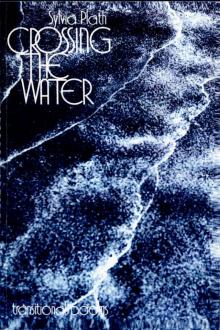 Crossing the Water
Crossing the Water Ariel
Ariel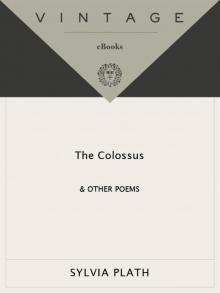 The Colossus
The Colossus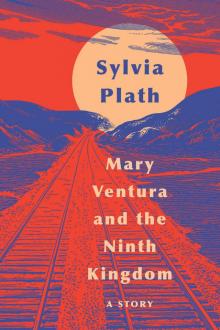 Mary Ventura and the Ninth Kingdom
Mary Ventura and the Ninth Kingdom The Letters of Sylvia Plath Vol 2
The Letters of Sylvia Plath Vol 2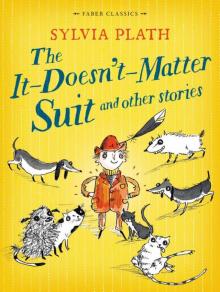 The It Doesn't Matter Suit and Other Stories
The It Doesn't Matter Suit and Other Stories The Letters of Sylvia Plath Volume 1
The Letters of Sylvia Plath Volume 1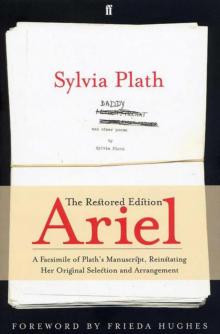 Ariel: The Restored Edition
Ariel: The Restored Edition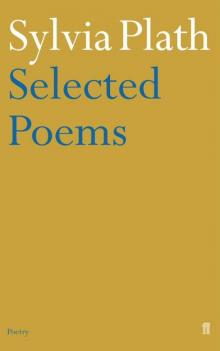 Selected Poems of Sylvia Plath
Selected Poems of Sylvia Plath